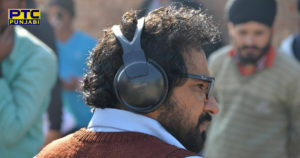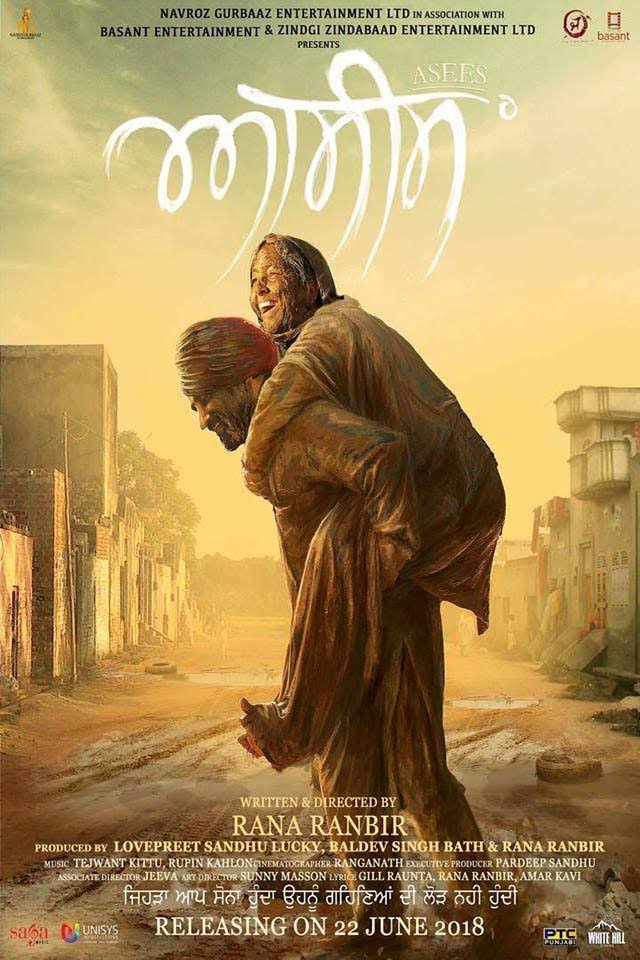

Asees, despite writer-director Rana Ranbir’s claims of great new Punjabi cinema, is actually inferior to many commercial dramas that have been well received by audiences like Amrinder Gill’s Angrej and others. It is too high on it’s socialist story of a mother and her mentally slow son Asees, played by Ranbir himself, and how she faces the cruel world where four of her five greedy kids despise her and her only caring son is Asees.Cinema, unlike theatre, is more like poetry – you must carefully choose each word that goes into making an effective poem otherwise the message, no matter how great, will be lost. And this is definitely the case with Asees as the director Ranbir is using a theatre-like Hammer instead of the grace of a beautiful poem.
 By R. Paul Dhillon
By R. Paul Dhillon
When Punjabi film and theatre star Rana Ranbir announced that he was venturing into direction, there was much excitement and hope that perhaps Punjabi cinema will have a new voice that will give the audience something besides the commercial comedies and dramas that dominate the multiplexes and usually end up being failures with the audience majority of the time.
After seeing Asees last Thursday during a premiere showing in Surrey – the film is a total disappointment and Rana Ranbir is at best an average Punjabi film writer-director.
Asees, despite Ranbir’s claims of great new Punjabi cinema, is actually inferior to many commercial dramas that have been well received by audiences like Amrinder Gill’s Angrej and others. It is too high on it’s socialist story of a mother and her mentally slow son Asees, played by Ranbir himself, and how she faces the cruel world where four of her five greedy kids despise her and her only caring son is Asees.
 While a story based strictly on this family dilemma and perhaps a few demons from her past would have been enough for a small budgeted film but Ranbir throws in so many useless plots and characters who are loud and very theatrical and the whole film experience feels that of a loud angry man shouting from a stage with nothing much to really say.
While a story based strictly on this family dilemma and perhaps a few demons from her past would have been enough for a small budgeted film but Ranbir throws in so many useless plots and characters who are loud and very theatrical and the whole film experience feels that of a loud angry man shouting from a stage with nothing much to really say.
Asees is directionless with uninteresting characters and a convoluted story that fails to connect with it’s intended audiences but it’s biggest problem is that it’s not subtle – it’s too loud, very over the top theatrical performances (only the actress playing the mother is effective and consistent in her performance).
 The film at times is trying to force sympathy from audience by showing the mother being hounded by all these extremely unsympathetic characters including her own children and the themes presented are not all that original.
The film at times is trying to force sympathy from audience by showing the mother being hounded by all these extremely unsympathetic characters including her own children and the themes presented are not all that original.
If I compare the themes and story structure of the national award winning Punjabi classic film Anney Ghore Da Daan by Gurvinder Singh – Ranbir’s presentation of social evils in Punjabi society is shallow and not effective at all.
Perhaps Ranbir’s fans and the Punjabi theatre audience mayl enjoy this hodge-podge of social drudgery but it’s not a subtle film for the art film world to take real notice. Ranbir tries to combine art film story-telling with commercial film elements that just don’t jell in any kind of meaningful way.
Some viewers may find the themes of women’s roles in Punjabi society, treatment of elders like mothers and fathers and the corruption of social relationships within the family unit and destruction brought on by pure greed to be hitting home for them but I found them to be too loud and not subtle and in fact trying to hit audiences over the head with it.
 Cinema, unlike theatre, is more like poetry – you must carefully choose each word that goes into making an effective poem otherwise the message, no matter how great, will be lost. And this is definitely the case with Asees as the director Ranbir is using a theatre-like Hammer instead of the grace of a beautiful poem.
Cinema, unlike theatre, is more like poetry – you must carefully choose each word that goes into making an effective poem otherwise the message, no matter how great, will be lost. And this is definitely the case with Asees as the director Ranbir is using a theatre-like Hammer instead of the grace of a beautiful poem.
Other issues I had with the film is that Ranbir shows that the mother is searching for her mentally slow son when he goes missing – she goes everywhere alone and gets so much grief and then he suddenly show in flashback that the son is married. Why would the Mother go look for the son by herself and not take his loving wife who should also be joining in the search along with her father.
But Ranbir only show the mother to seek sympathy for her from the audience – this in cinema is called manipulation by the writer-director to seek sympathy from the audience, which is neither effective nor subtle and more importantly not real at all. In western cinema critique, it simply called dishonest cinema.
And finally – perhaps it was not Ranbir’s intention to do this in the inter-caste part of the film’s story but Jatts come off as one-sided women beaters and patriarchal Demons. But male chauvinism and male dominance and control of women’s minds and bodies are done by all men in Indian society – Dalits, backward caste people, Hindus – all men and not just Jatts.
But to be fair, it may not have been Ranbir’s intention as most of the men in Asees, from the loud and hypocrite kidnapper to the corrupt sexually deviant police inspector to other cops and even the male children of the main protagonist the Mother, are all bad and evil.
The only good men are the mentally slow son, his shoe cobbler “mocha” father-in-law and the music video director, who helps the mother try to find the missing son
Asees is an okay first effort from Rana Ranbir, who has proven himself in film, theatre and writing scripts-dialogue for Punjabi films but he has a long way to go if he wants to be taken seriously as a writer-director of meaningful films. It’s safe to be in the commercial film arena where audiences either love or hate your movies and you have nothing to prove to critics or audiences but in it’s not the same in the art film-meaningful cinema world where you are asking the viewers and critics to judge you.
Despite this ineffective first outing as writer-director and producer (Ranbir co-produced with two Surrey producers), Ranbir’s fans and lovers of social-realist cinema will enjoy your movie in parts and hopefully he will be able to deliver better films in the future.
R. Paul Dhillon is a film critic, writer-editor-journalist (editor of the Link newspaper and editor-founder of DESIBUZZCanada) and a film writer-director-producer (Sweet Amerika starring Gulshan Grover and upcoming DESI ANGREJ: The Fusion Generation).




Be the first to comment on "Asses Disappoints With It’s Convoluted Story And Extreme And Loud Characters"